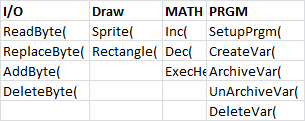Another big problem is fixed: custom tokens. Now it finally works fine!

The code is so complicated you don't want to see it
I had 2 possibilities: either locating the hooks at a fixed point in RAM, or create my own appvar, and insert them. I chose the last option, because compiled ICE programs can use all the RAM, and I suffer what will happen when one accidentally overwrites the hooks. So, each time I start ICE, it checks if it exists, remove it if necessary and create an appvar with the hooks in it. Then it archives it, so it's a bit harder to delete it, and if you delete it from the memory management, it still exists. The main problem is, that you now don't know what the starting memory of the hooks is, for relative jumps/whatever. So yeah, it seems I fixed it, and I'm pretty happy with it ^^
Now that I have fixed the main structure, is it pretty easy to add new tokens.

The code is so complicated you don't want to see it
I had 2 possibilities: either locating the hooks at a fixed point in RAM, or create my own appvar, and insert them. I chose the last option, because compiled ICE programs can use all the RAM, and I suffer what will happen when one accidentally overwrites the hooks. So, each time I start ICE, it checks if it exists, remove it if necessary and create an appvar with the hooks in it. Then it archives it, so it's a bit harder to delete it, and if you delete it from the memory management, it still exists. The main problem is, that you now don't know what the starting memory of the hooks is, for relative jumps/whatever. So yeah, it seems I fixed it, and I'm pretty happy with it ^^
Now that I have fixed the main structure, is it pretty easy to add new tokens.















